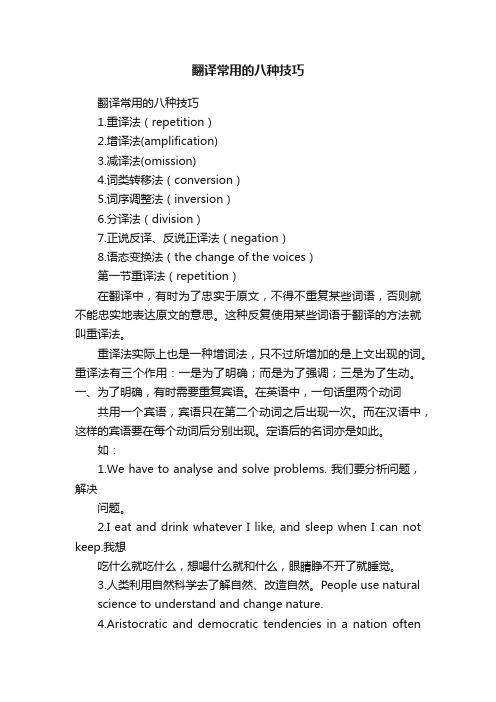翻译技巧2 Converting
翻译常用的八种技巧

翻译常用的八种技巧翻译常用的八种技巧1.重译法(repetition)2.增译法(amplification)3.减译法(omission)4.词类转移法(conversion)5.词序调整法(inversion)6.分译法(division)7.正说反译、反说正译法(negation)8.语态变换法(the change of the voices)第一节重译法(repetition)在翻译中,有时为了忠实于原文,不得不重复某些词语,否则就不能忠实地表达原文的意思。
这种反复使用某些词语于翻译的方法就叫重译法。
重译法实际上也是一种增词法,只不过所增加的是上文出现的词。
重译法有三个作用:一是为了明确;而是为了强调;三是为了生动。
一、为了明确,有时需要重复宾语。
在英语中,一句话里两个动词共用一个宾语,宾语只在第二个动词之后出现一次。
而在汉语中,这样的宾语要在每个动词后分别出现。
定语后的名词亦是如此。
如:1.We have to analyse and solve problems. 我们要分析问题,解决问题。
2.I eat and drink whatever I like, and sleep when I can not keep.我想吃什么就吃什么,想喝什么就和什么,眼睛睁不开了就睡觉。
3.人类利用自然科学去了解自然、改造自然。
People use naturalscience to understand and change nature.4.Aristocratic and democratic tendencies in a nation oftenshowthemselves in its speech.民族的贵族倾向和民族倾向常在其言语中表现出来。
5.我们来修改安全规则和卫生规则吧。
Let’s revise our safety andsanitary regulations.二、英语常用省略,但为了明确,也为了强调某些内容,在汉语中常常要将省去的部分重译出来。
常用的翻译技巧

常用的翻译技巧1. 重复法(repetition)2. 增译法(amplification)3. 减译法(omission)4. 词类转移法(conversion)5. 词序调整法(inversion)6. 分译法(division)7. 正说反译, 反说正译法(negation)8. 语态变换法(the change of the voices)1. 重复法We have to analyze and solve problems. 我们要分析问题,解决问题。
Le t’s revise our safety and sanitary regulations. 我们来修改安全规则和卫生规则吧。
Gentlemen may cry, peace, peace --- but there is no peace. 先生们尽管可以高呼和平,和平!但是依然没有和平。
He had it all written out neatly. 他把它写得清清楚楚。
1. 这种人闹什么东西呢闹名誉,闹地位,闹出风头。
What are they after They are after name, after position, and they want to cut smart figure.2. 大(家庭)有大(家庭)的难处。
A large family has its difficulties.3. 天苍苍, 野茫茫, 风吹草低见牛羊。
The sky is blue, blue; And the steppe wide, wide; Over grass that the wind has battered low; Sheep and oxen roam.4. 寻寻觅觅, 冷冷清请, 凄凄惨惨戚戚; 乍暖还寒时侯, 最难将息。
(译文1)Seek, seek; search, search; Cold, cold; bare, bare; Grief, grief; cruel, cruel grief. Now warm, then like the autumn cold again, How hard to calm the heart! (译文2)I seek but seek in vain, I search and search again; I feel so sad, so drear, So lonely, without cheer. (许渊冲译)2. 增译法增词义增加虚词为多,也可酌量增加实词。
实用英语翻译4 Basic Translation Skill_Conversion

他抽烟抽得很凶。 He is a heavy smoker.
他倒是不抽烟,但他的爸爸却一支接一支地抽( 是个老烟枪)。 He is no smoker, but his father is a chainsmoker.
More es…
另外,有些英语中名词尽管本身并不具有很强 的动作意味,但为了汉语表达的通顺自然,也 可以将其转译为汉语中的动词: Give me liberty or give me death. 不自由,毋宁死。 He is an enemy to reform. 他反对改革。
3 形容词转译成动词(adj.---v.)
Students should be respectful to their teachers. 学生应该尊重老师。 I am doubtful of his sincerity. 我怀疑他的诚意。
(英文中表情感、知觉等心理状态的形容词,如 sure, thankful, aware等,在系动词be、look、 become、seem…等之后,往往可以转译为中文 动词。)
一、汉语动词转换成英语名词
动词变名词或名词短语,可以减少主谓结构的数 量和提升文体档次,多用于政论,描述,科技文 章中。 中国成功地爆炸了第一颗原子弹,在全世界引起 了巨大的反响。 China’s successful explosion of its first atom bomb caused tremendous repercussions throughout the world.
Some of my students are good writers. 我有些学生文章写得很好。
英语中一些带有词缀“er”或“or”的名词有时不一 定表示职业或者身份,却可以表示某种动作的执行 者,带有较强的动作意味,因此可以转译成动词。
翻译技巧(2)

4. 转换法(conversion)
⑸名词转换成动词 这种情况比较少,但一旦转换,原来修辞名词的形容词也要随 之转换为副词。 例:他的讲演给听众留下很深的印象。 His speech impressed the audience deeply.
4. 转换法(conversion)
二、句子成分转换 Conversion of Ingredients
4. 转换法(conversion)
⑶ 名词转译成副词 由副词派生出来的名词,往往可以转译成副词。 例:The new mayor earned some appreciation by courtesy of coming to visit the city poor. 新市长有礼貌地前来访问城市贫民,获得了他们的一些好感。 ⑷ 形容词转译成名词 ① 有些形容词加上定冠词表示某一类人,汉译时常译成名词。 例:They did their best to help the poor. 他们尽最大努力帮助穷人。 ② 由名词派生的形容词可转译成名词。 例:The Wilde family were religious. 王尔德全家都是虔诚的教徒。
4. 转换法(conversion) ⑶表语译成谓语 系动词be+表语结构,若表语含有一定的动作意义时,常把 表语直接译成谓语,把be省译不译。 例:This explanation is against the natural law. 这种解释违背自然规律。 ⑷宾语译成谓语 原文谓语动词不宜对应译成汉语谓语动词,且宾语又具有 动词意义时,可将该宾语转译成谓语,原谓语省译。 例:This chapter provides a brief review of applicable network theory. 本章扼要复习网络的应用理论。 ⑸补语译成谓语 作补语用的分词短语、介词短语、不定式短语,若具有动 词意义时,常转译成句子的一个谓语。 例:We see airplanes flying in the sky and ships sailing in the sea. 我们看见飞机在空中飞翔,轮船在海中航行。
四种翻译方法,十种翻译技巧

四种翻译方法1.直译和意译所谓直译,就是在译文语言条件许可时,在译文中既保持原文的内容,又保持原文的形式——特别指保持原文的比喻、形象和民族、地方色彩等。
每一个民族语言都有它自己的词汇、句法结构和表达方法。
当原文的思想内容与译文的表达形式有矛盾不宜采用直译法处理时,就应采用意译法。
意译要求译文能正确表达原文的内容,但可以不拘泥与原文的形式。
(张培基)应当指出,在再能确切的表达原作思想内容和不违背译文语言规范的条件下,直译有其可取之处,一方面有助于保存原著的格调,另一方面可以进新鲜的表达方法。
Literal translation refers to an adequate representation of the original. When the original coincides or almost tallies with the Chinese language in the sequence of vocabulary, in grammatical structure and rhetorical device, literal translation must be used.Free translation is also called liberal translation, which does not adhere strictly to the form or word order of the original.(郭著章)直译法是指在不违背英语文化的前提下,在英译文中完全保留汉语词语的指称意义,求得内容和形式相符的方法。
意译是指译者在受到译语社会文化差异的局限时,不得不舍弃原文的字面意义,以求疑问与原文的内容相符和主要语言功能的相似。
(陈宏薇)简单地说,直译指在译文中采用原作的的表达方法,句子结构与原句相似,但也不排除在短语层次进行某些调整。
意译指在译文中舍弃原作的表达方法,另觅同意等效的表达方法,或指对原作的句子结构进行较大的变化或调整。
汉英翻译技巧之词类转换法Conversion

汉英翻译技巧之词类转换法 Conver sionConver sion: Conver sionis also a common practi ce in Chines e-Englis h transl ation. It is to change the part of speech into anothe r.1. Verbsto be conver ted into Nouns.1) 林则徐认为,要成功地制止鸦片买卖,就得首先把鸦片销毁。
Lin Zexu believ ed that a succes sful of the tradein opiumshould be preced ed bya of the drug itself.2) 邓小平在―十一大‖上说:―一定要少说空话,多做工作‖。
Deng Xiaopi ng said at the 11th PartyCongre ss,―Theremust be and .‖(v.--n.)3) 绝对不许违反这个原则。
No of this princi ple can be tolera ted. (v.—n.)4)采用这种新装置可以大大降低废品率。
The of this new device will greatl y cut down/reduce the percen tageof defect ive produc ts.5) 他在讲话中特别强调提高产品质量。
He raisin g the qualit y of produc ts in his speech.6) 中国人民百年以来不屈不挠、再接再厉地英勇斗争,使得帝国主义至今不能灭亡中国,也永远不能灭亡中国。
Thanks to the Chines e people’sunrele nting and heroic during the last hundre d years,imperi alism has not been able to conque r/subjug ate/disint egrat e China, nor will it ever be able to do so.7) 他们一不会做工,二不会种地,三不会打仗。
翻译技巧(2)词类转换法

我曾经跟一个养了条狗的女人进行过一系列的约会, 我曾经跟一个养了条狗的女人进行过一系列的约会, 那些狗的主人对我来说是个 on the assignment I.Review and comments 但多未能取得我预期效果,每一次要跟她亲热, 但多未能取得我预期效果,每一次要跟她亲热, 百思不得其解的谜。 百思不得其解的谜。 他总是要走人,说是要回家遛狗去! 他总是要走人,说是要回家遛狗去! Dog owners are a mystery to me. I once went on a long series of:原来她不想跟我亲热啊! 我现在搞懂这是咋回事了:原来她不想跟我亲热啊! 我现在搞懂这是咋回事了 nonproductive dates with one, and every time we were about to fool around she would have to leave to go home and walk her dog. Hey, wait. I think I just figured out something.
I. Review and comments on the assignment 我决定,我再也不做自己的恐惧的受害者了。 我决定,我再也不做自己的恐惧的受害者了。 纽约市的公园管理部宣称, 纽约市的公园管理部宣称,狗对曼哈顿的公园草坪 造成的破坏每年达250,000美元之多。这个部门 美元之多。 造成的破坏每年达 , 美元之多 准备给主动举报不给狗系皮带的主人的人发手机。 准备给主动举报不给狗系皮带的主人的人发手机。 I decided that I’m no lБайду номын сангаасnger going to remain a victim of my fears. The New York City parks department, which claims dogs do $250,000 worth of damage each year to park lawns in Manhattan, is going to hand out cell phones to volunteers willing to turn in owners of unleashed dogs.
翻译技巧词类转换法

常用词类转换形式
A. Converting to verbs(转译成动词)
1 名词转译成动词 (n.---v.) 2 介词转译成动词。(prep.---v.) 3 形容词转译成动词(adj.---v.) 4 副词转译为动词(adv.---v.)
新市长有礼貌地访问城市贫民赢得了人们旳尊敬。
Exercise
1. Arrogance and complacence turned out to be his ruin.
2. With slight modification each type can be used for all three systems.
重量单位是克,长度单位是米,容量单位是升。
The machine can dimensionally be changeable according to consumers’ need.
机器旳在大小(或尺寸)能够根据顾客旳需要变化。
All you have done is proportional to all you
发展旳道路虽然漫长,可我们已坚定地走了上这条路。
He is walking in the park with an umbrella in his hand.
他在公园散步,手里拿着一把伞。
It is our goal that the people in the undeveloped areas will be finally off poverty.
have achieved.
- 1、下载文档前请自行甄别文档内容的完整性,平台不提供额外的编辑、内容补充、找答案等附加服务。
- 2、"仅部分预览"的文档,不可在线预览部分如存在完整性等问题,可反馈申请退款(可完整预览的文档不适用该条件!)。
- 3、如文档侵犯您的权益,请联系客服反馈,我们会尽快为您处理(人工客服工作时间:9:00-18:30)。
Converting into Nouns
–
A Verbs Converted into Nouns
•
1. Verbs transformed from nouns(名词转化的动词)
•
•
• •
e.g. The design aims at automatic operation, easy regulation, simple maintenance and high productivity. 设计的目的在于自动操作、调节方便、维护简易、 生产率高。 e.g. To them, he personified the absolute power. 在他们看来,他就是绝对权威的化身。
Converting into Adverbs
–
A Adjectives Converted into Adverbs:
•• • •Fra biblioteke.g. Only when we study their properties can we make better use of these materials. 只有研究这些材料的特点才能更好地利用它们。 e.g. A helicopter is free to go almost anywhere. 直升机几乎可以自由地飞到任何地方。
–
C Adverbs Converted into Nouns
•
• •
e.g. Nowadays many people in the society are materially rich but spiritually poor. 当今社会中,有许多人物质富有却精神空虚。
–
D Pronouns Converted into Nouns
•
2. Passive voice(英语被动句式常可译为受到/遭到/予以/加以+ 名词的形式)
•
•
e.g. The invasion of another independent country must be stopped. 侵犯另一个独立国家的行为必须予以制止。
–
B Adjectives Converted into Nouns
C Adjectives Converted into Verbs
D Adverbs Converted into Verbs
e.g. With only one day off in a week, working people barely had enough time to arrange the household. 一周只休息一天(一周只有一天休息), 上班族几乎没有足够的时间安排家务。
–
B Nouns Converted into Adverbs
•
•
e.g. I have the honor to inform you that your request is granted. 我荣幸地通知你,你的请求已得到批准。
•
Classroom Exercises
• •
•
•
•
• •
•
•
•
–
2. Nouns containing verbal sense(含有动作意思的名 词)
•
•
e.g. A look at his photos reminded me of our school days. 看到他的照片使我想起了我们的学生时代。
–
3. Nouns with suffix “–er” do not always stand for people’s identity or profession; sometimes they embody a verbal sense instead. These nouns are often converted into verbs during translating, especially when they do not have Chinese equivalents.(一些加后缀-er的名词有 时并不指其身份或职业,而是含有较强的动作意味。 在汉语中没有对应的名词时,往往译为动词。)
•
e.g. Radio waves are similar to light waves except that their wavelength is much greater. 无线电波与光波相似,但无线电波的波长要长 得多。
•
Converting into Adjectives
A Nouns Converted into Adjectives (a/an + n.)
1. Meanwhile, half-starved and often ill, Crane continued to write. 2. The language of the poem is colloquial, yet it's deep in its understanding of human emotions. 3. Independent observers have commented favorably on the achievements you have made in this direction. 4. Traditionally, there had always been good relations between them. 5. No wonder the sight of it should send the memories of quite a number of people of the old generation back 36 years ago. 6. It is impossible to live in society and be independent of society. 7. The lecture was called Thieves, and was a demonstration that the proprietor of an unearned income inflicted on the community exactly the same injury as a burglar does. 8. The young scholar worked long hours, on meager food, in cold hut, by dim lamp. 9. She skimmed over the lawn, up the path, up the steps, across the veranda and into the porch. 10. Most U.S. spy satellites are designed to burn up in the earth’s atmosphere after completing their missions.
• •
• •
• • • •
•
•
• •
Reference Version: 1.在此期间,克兰处于半饥饿状态,而且常常生病,但他仍坚持写作。 (a.→n.; a.→v.) 2. 诗的语言虽很通俗,但对人的感情的揭示/理解却有深度。(a.→n.) 3. 有独立见解的观察家们对你们在这方面取得的成就给予了积极的评 价。(v.+adv. → v.+a.+n.) 4. 他们之间一直保持着传统的友好关系。(adv.→a.) 5. 难怪老一辈的人见了这个就会想起36年前的往事。(n.→v.) 6. 生于社会,就不可能脱离社会。(a.→v.) 7. 演讲的题目是“贼”,表明了一个攥取不义之财的人对公众造成的 危害和盗贼是完全一样的。(n.→v.) n. v. 8. 年轻的学者吃着简单的饭食,住在寒冷的茅屋,靠着昏暗的灯光, 长时间地工作着。(prep.→v.) 9. 她轻盈地越过草地,跑上小道,跨上台阶,穿过凉台,走进了门廊。 (prep.→v.) 10. 大多数美国卫星完成使命后,按其设计在大气层中焚毁。(v.→n.)
B Prepositions Converted into Verbs
e.g. Did you see the boy in blue? 你看到那个穿蓝衣服的男孩了吗? e.g. Drug taking is against the law. 吸毒是违法的。
–
•
•
• • •
英语中表示知觉、情感、欲望等心理状态的形 容词,在联系动词后做表语时,往往转译成动 词。例如:able, afraid, angry , anxious, ashamed, aware, careful, cautious, certain, concerned, confident, delighted, doubtful , ignorant, glad, grateful, sorry, sure ,thankful, etc. e.g. The doctors said that they are not sure whether they can save his life. 医生说他们不敢肯定能否挽救他的生命。 e.g. I have to be cautious. 我必须小心谨慎才是。
Translation Techniques(2)
Converting
•
Owing to the different thinking styles and language habits of English and Chinese, some parts of speech have to be converted into others during translating to convey the proper meaning of the original. Mainly there are four ways of such converting: Converting into verbs Converting into nouns Converting into adjectives Converting into adverbs
